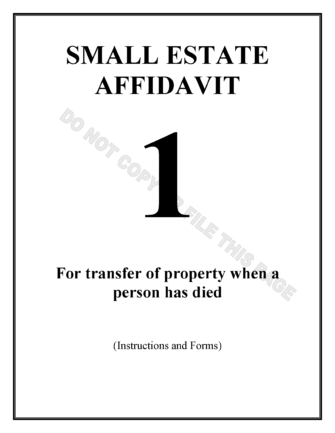

An Arizona small estate affidavit is used to transfer real and personal property of someone who has died (“decedent”) to a surviving spouse or other beneficiary (“successors”) without going through probate. A small estate affidavit still has to be filed with the probate court; however, a court hearing won’t be necessary. This will save the successors time and money, as probate cases can drag on for a long time.
In order to qualify for this type of transfer process, the value of all personal property in the estate cannot exceed $75,000, and the value of all real property cannot exceed $100,000. Furthermore, the successor has to be named in the will to be able to claim the property mentioned in the affidavit. If the decedent died intestate (without a will), the laws of survivorship will apply (i.e., spouse>child>parent>sibling).
Before completing and filing a small estate affidavit, a successor must make sure they are qualified to transfer the property and that the estate meets the necessary requirements. The following must apply:
The Small Estate Affidavit form packet contains all the documents and instructions for a successor to claim an interest in real and/or personal property. If the successor wishes to claim only personal property, they need only complete pages 5-7 of the packet (the Affidavit for Collection of Personal Property). It is not required that they file this affidavit with the probate court. However, those who intend to claim an interest in both real and personal property will need to complete all forms (or, if claiming only real property, all forms except pages 5-7) and file them with the probate registrar (see Step 3).
If the successor is claiming an interest in real property, they will have to complete the appropriate forms in the small estate affidavit packet and file them with the probate court. They can accomplish this by handing over all the forms as well as a copy of the original will and a certified death certificate to the probate registrar at one of the County Superior Court locations. A certified copy of the affidavit will be provided by the Registrar. Successors attempting to claim personal property can skip this step.
To claim interest in personal property, the successor can take the affidavit to the person/entity currently holding the property (they might demand a copy of the will, if applicable, and a copy of the death certificate). To transfer real property, the successor must take the certified copy of the affidavit and record it with the county recorder in the county where the property is located. This will transfer the title of the property to the successor.